May 21, 2025 | 09:19 GMT +7
May 21, 2025 | 09:19 GMT +7
Hotline: 0913.378.918
May 21, 2025 | 09:19 GMT +7
Hotline: 0913.378.918
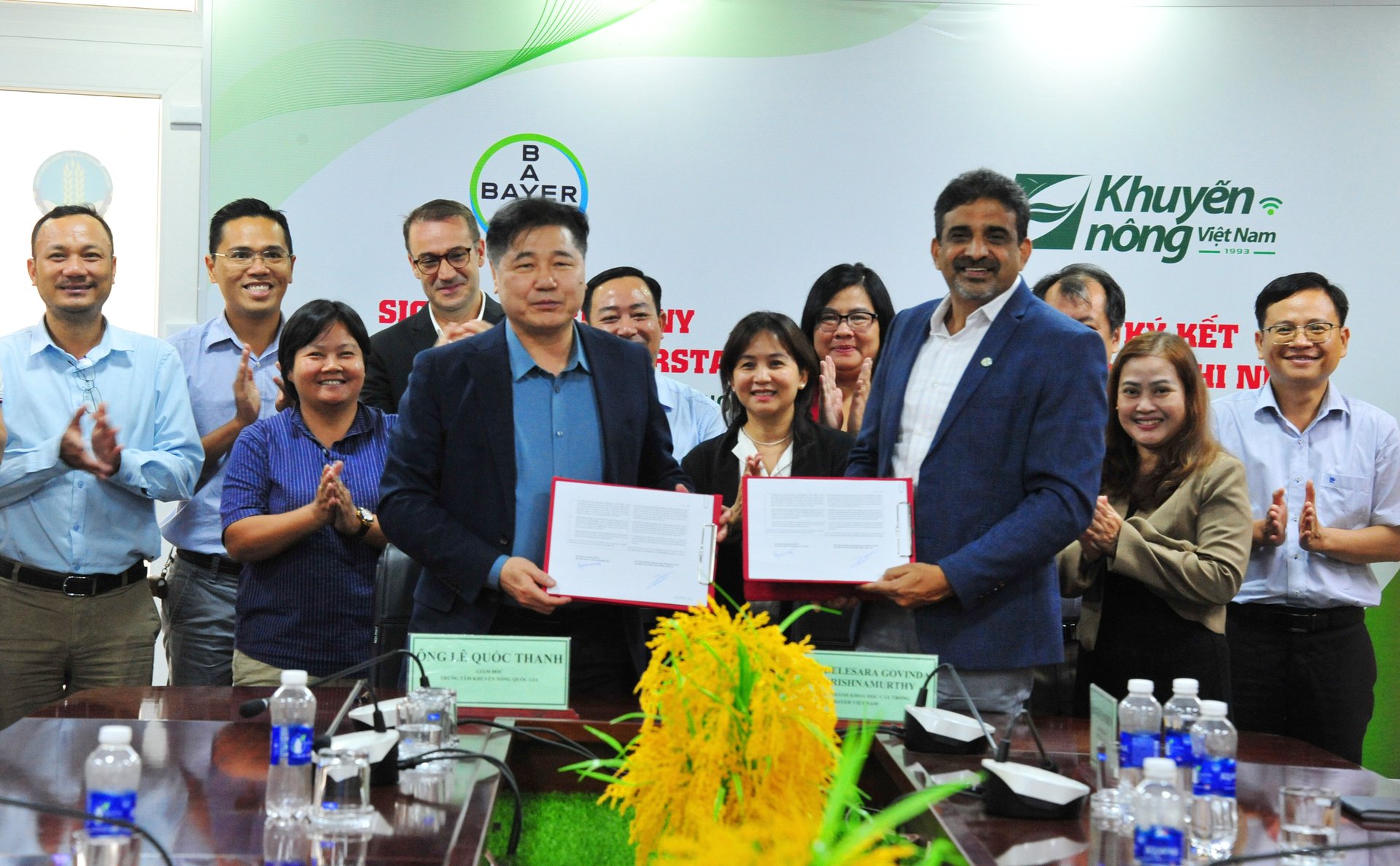
Representatives of Bayer Vietnam and the National Agricultural Extension Center have signed a partnership agreement to expand the development of effective and safe farming models for rice, durian, and coffee. Photo: Le Hoang Vu.
On April 8, Bayer Vietnam LLC (Bayer) and the National Agricultural Extension Center (NAEC) signed a Memorandum of Understanding (MoU) to expand their collaboration in developing sustainable farming models and promoting the effective, safe cultivation of rice, durian, and coffee in Vietnam by 2025.
This signing ceremony marks a significant milestone in the partnership between Bayer and the NAEC, following the successes achieved in the 2023-2025 phase. The primary objective of this MoU is to support the development of the One Million Hectares of High Quality and Low-Emission Rice Project in the Mekong River Delta.
Additionally, the partnership aims to advance farming models that focus on pest management, environmental sustainability, and safety, specifically in key durian and coffee growing regions, including the Central Highlands.
Mr. Le Quoc Thanh, Director of the National Agricultural Extension Center, emphasized: "This is a crucial step in public-private partnership, applying science and technology to help farmers overcome agricultural challenges through a well-established agricultural extension system and network. The models we have implemented over time have achieved positive results, which can now be scaled up and used for further technology transfer. The NAEC firmly believes that, in partnership with Bayer and other stakeholders in the agricultural value chain, we can significantly enhance the capacity of farmers to apply safe, efficient, and environmentally-friendly farming solutions. This will not only improve productivity and sustainability but also align with the national goals of fostering sustainable agricultural development and transitioning to a green economy".
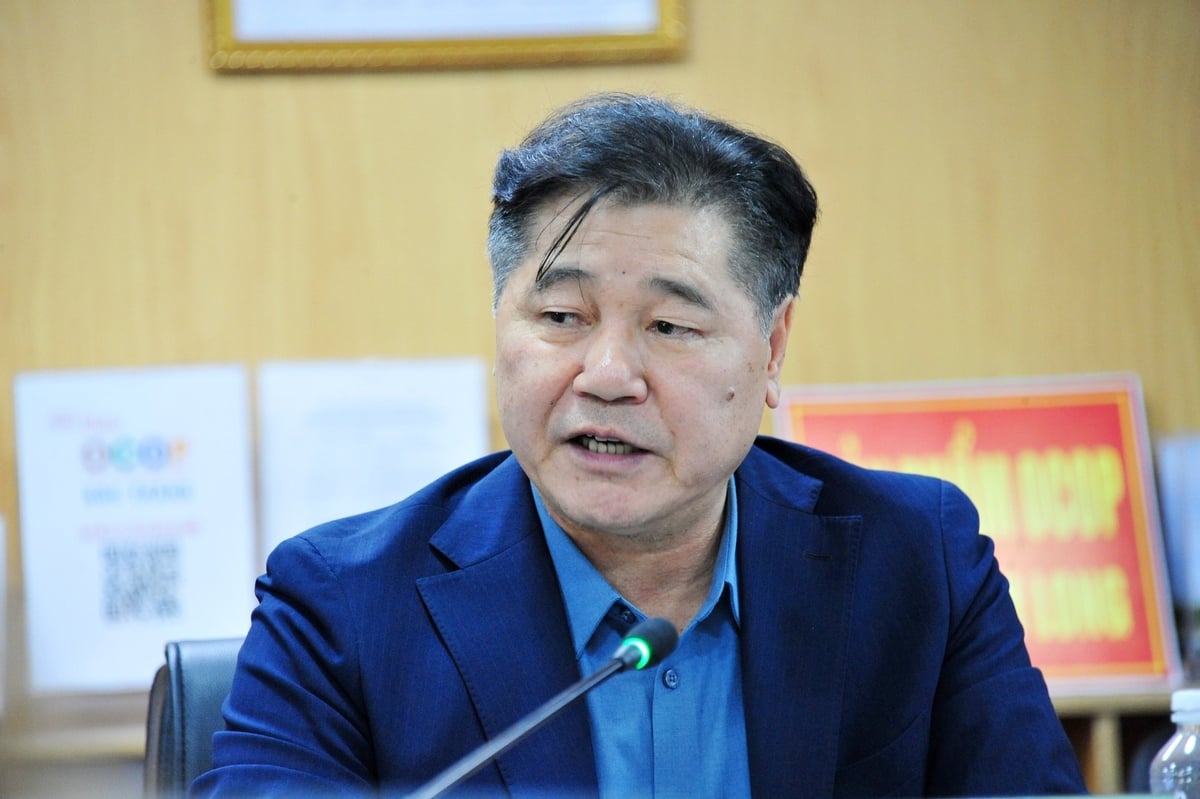
Mr. Le Quoc Thanh, Director of the National Agricultural Extension Center, delivered a speech at the signing ceremony. Photo: Le Hoang Vu.
According to Mr. Le Quoc Thanh, when both parties collaborate, they will focus on several key activities:
Firstly, improved farms: Establishing model farms in key areas of the Mekong Delta and the Central Highlands to demonstrate and replicate innovations in farming practices for rice, durian, and coffee.
Secondly, improving farm management practices: Implementing integrated management programs, including advanced crop protection technologies for rice, durian, and coffee farmers. The two parties will also discuss the possibility of improving the system for monitoring and tracing agricultural product origins.
Thirdly, disseminating sustainable farming practices: Developing and disseminating educational materials through various media channels to help farmers easily access and adopt innovative and sustainable farming methods.
Lastly, customized agronomic solutions: Bayer will work closely with farmers to optimize crop protection efficiency, thereby enhancing both the yield and quality of crops.
In 2025, the specific collaborative activities will primarily focus on rice cultivation. The Bayer ForwardFarming satellite model (Sustainable Agriculture for the Future) will be expanded in key rice-producing provinces of the Mekong Delta. This will involve establishing model farms as part of the 1 million-hectare project. In addition, training sessions will be organized for agricultural extension officers, cooperatives, and farmers on plant protection solutions and sustainable rice farming practices. The collaboration will also include conferences, workshops, and communication efforts to improve the overall capacity for rice production.
For durian and coffee, the partnership will focus on selecting and establishing Better Life Farming models (Pioneering Agriculture - Prosperous Farmers) in key growing regions of the Central Highlands. Training sessions will be held on sustainable pest management practices and bumper crop solution. Furthermore, the partnership will organize workshops and communication activities to promote public-private collaboration in sustainable farming. This will include the adoption of new technologies, such as precision fertilization and pesticide spraying via irrigation systems, as well as using weather data to optimize treatment processes in the fields.
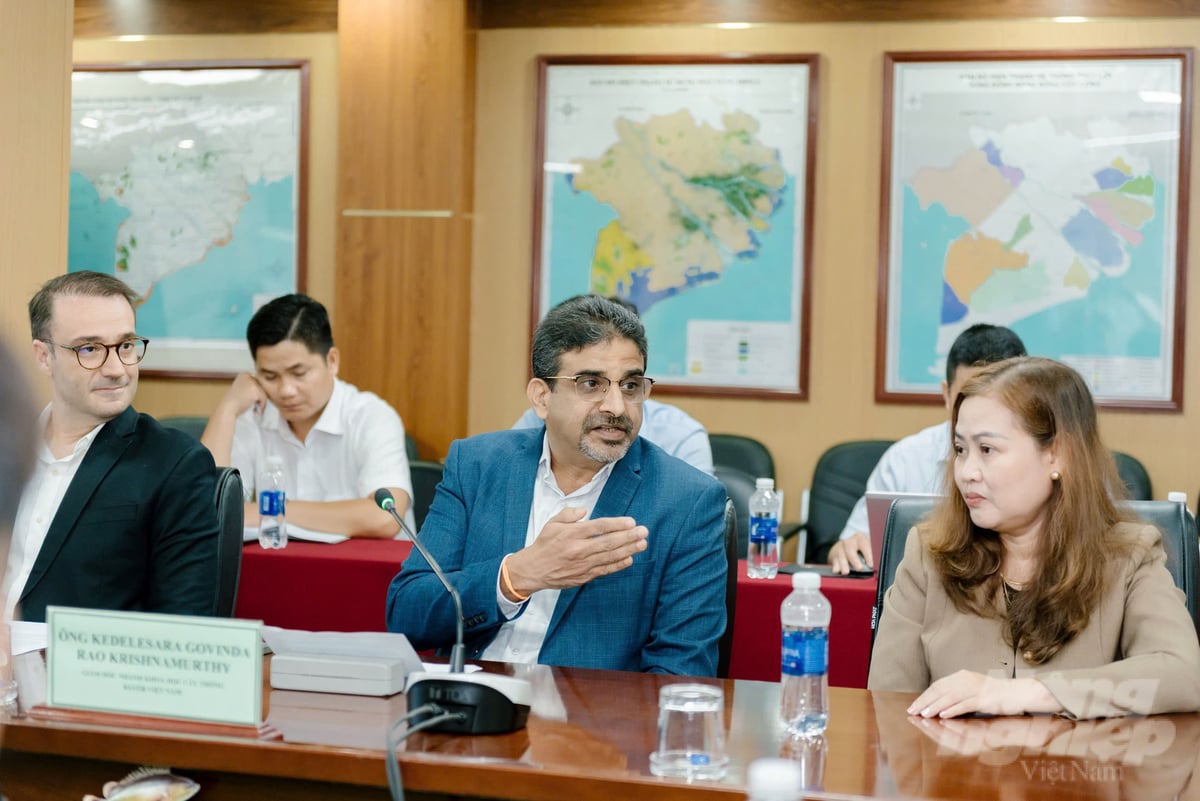
Representatives of Bayer LLC at the signing ceremony. Photo: Le Hoang Vu.
Speaking at the signing ceremony of the collaboration between the National Agricultural Extension Center and Bayer Vietnam, Mr. KG Krishnamurthy, Director of Bayer Vietnam’s Crop Science Division, highlighted the long-standing partnership between the two organizations. He remarked: “Today’s signing marks the continuation of our long-standing relationship, especially following the success of the ‘Bayer–Better Life Farming’ project, which has been focused on developing sustainable agriculture in the Mekong Delta over the past three years. Through this project, we have successfully trained and transferred technology to over 5,000 farmers, achieving many positive results such as reducing greenhouse gas emissions, saving input materials, and improving both productivity and profitability for farmers".
Building on this success, Bayer plans to continue implementing specific initiatives this year. The focus will not only remain on rice farming but will also expand to durian and coffee cultivation. Bayer aims to strengthen its commitment to sustainable agriculture by offering training programs and developing farming models. These efforts will be guided by measurable indicators from two key programs: Bayer Farm for rice cultivation and Better Life Farming for durian and coffee.
Mr. Krishnamurthy emphasized: "We are committed to continuing our journey alongside Vietnamese farmers as they transition to a more sustainable, modern, and efficient agricultural model".
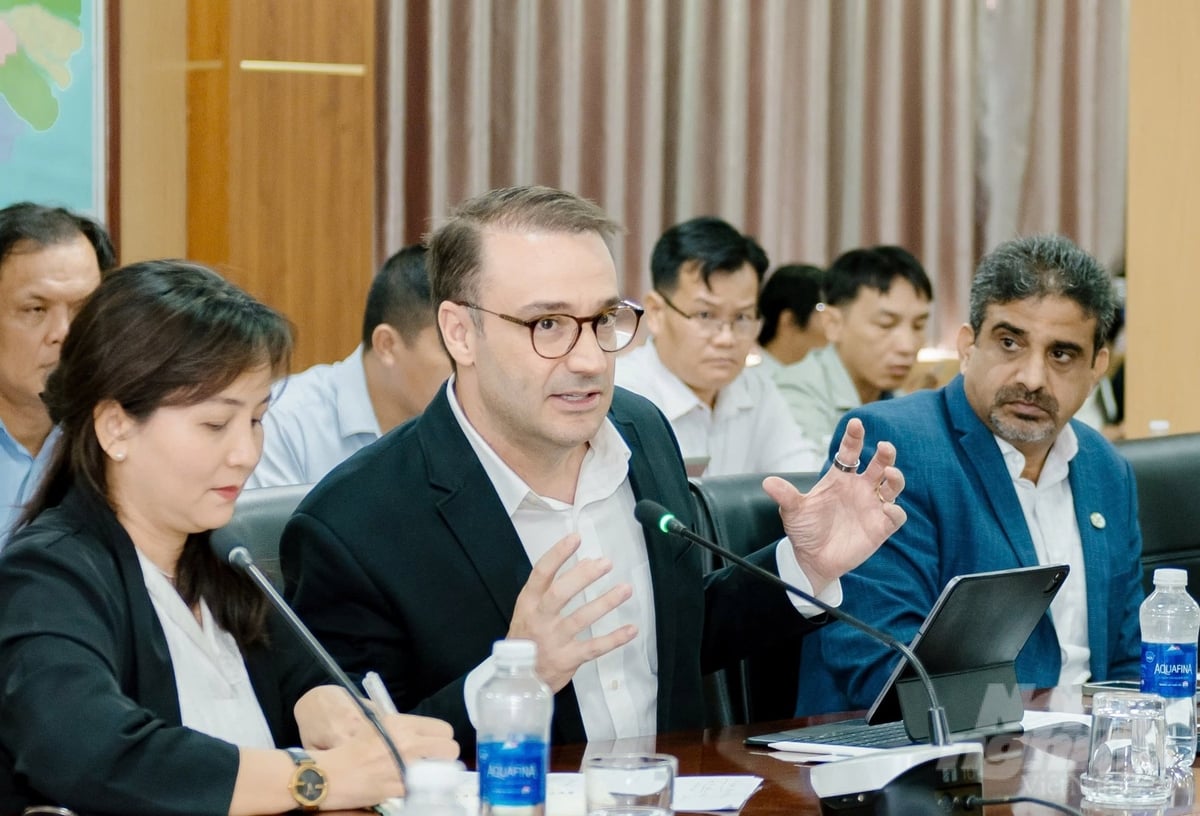
Mr. Mateus Barros, Director of Bayer's crop science division for Southeast Asia and Pakistan, delivered a speech at the signing ceremony. Photo: Le Hoang Vu.
According to Mr. Mateus Barros, Director of Bayer's Crop Science Division for Southeast Asia and Pakistan, Bayer is focused on pursuing specific objectives aimed at advancing global sustainable agriculture. In Vietnam, the company has implemented numerous advanced farming models through strategic public-private partnerships. These efforts serve as clear evidence of Bayer’s long-term commitment to the country, and they also highlight the company's ongoing efforts to support farmers in building a modern, environmentally-friendly agricultural sector. By contributing to the development of sustainable practices, Bayer is fulfilling its mission of “Healthy people, prosperous homes".
The Bayer ForwardFarming project, launched in 2023, has successfully established sustainable rice farming models, directly contributing to the 1 million-hectare project for developing high-quality, low-emission rice in the Mekong Delta. This initiative has provided technology transfer to over 4,500 rice farmers, resulting in remarkable improvements in productivity, crop quality, resource efficiency, and environmental impact reduction.
Additionally, other success stories have emerged from ForwardFarming models in Chau Phu District, An Giang Province, and Go Quao District, Kien Giang Province. Several 50-hectare models under the National Agricultural Extension Center's project, with Bayer's involvement in the 2024-2025 winter-spring season, have shown impressive results. These successes provide a strong foundation for the continued implementation of the 1 million-hectare project in the Mekong Delta region.
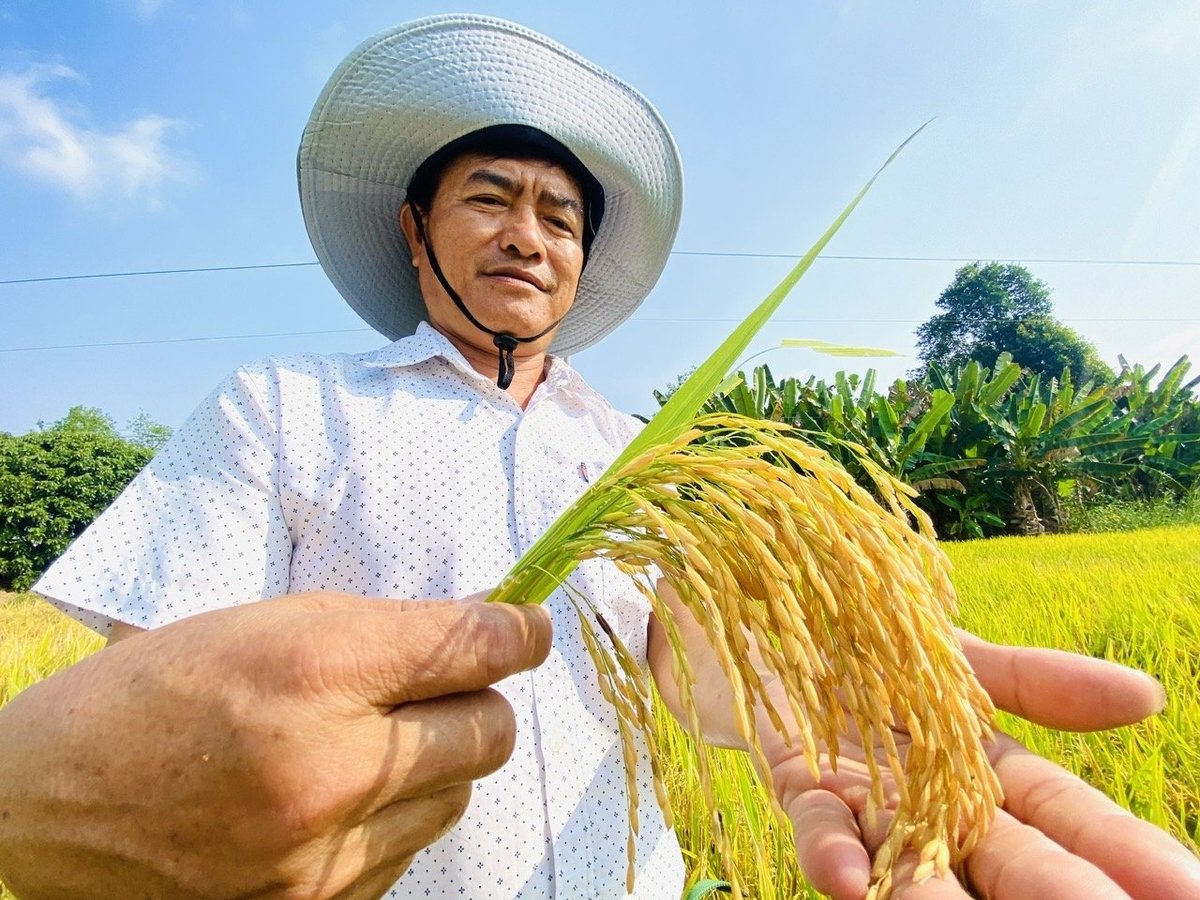
The Bayer ForwardFarming project, which has transferred technology to over 4,500 rice farmers, has demonstrated significant improvements in productivity, quality, resource efficiency, and environmental impact reduction. Photo: Le Hoang Vu.
This signing ceremony of the Memorandum of Understanding not only marks a significant milestone in the public-private partnership between Bayer and the National Agricultural Extension Center, but also emphasizes the importance of promoting the widespread adoption of sustainable farming practices, aiming towards a regenerative agriculture system. By combining the strengths and resources of both the public and private sectors within the agricultural value chain, this collaboration aims to build the capacity of Vietnamese farmers through community-based agricultural extension systems. It also contributes to the achievement of sustainable development goals, supporting the economic transformation of Vietnam's agricultural sector while meeting the real needs of farmers and the market.
Translated by Phuong Linh
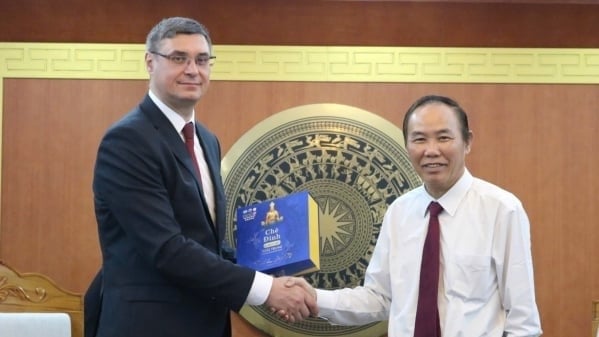
(VAN) The trade turnover of agro-forestry-fishery products is growing significantly, along with investment cooperation commitments that are opening up new development directions between Vietnam and Russia.

(VAN) Khanh Hoa is investing over 545 billion VND to develop 240 hectares of high-tech marine aquaculture in order to guarantee a consistent supply of seafood exports and achieve the USD 1 billion target.

(VAN) Minister of Agriculture and Environment Do Duc Duy held a meeting with Soopakij Chearavanont, Chairman of C.P. Group, on May 15.
/2025/05/16/3800-0-nongnghiep-143756.jpg)
(VAN) Suntory PepsiCo Vietnam coordinated with the Ministry of Education and Training to implement an education program on water conservation, reaching nearly 1 million primary school students nationwide.

(VAN) Vietnam’s TH Group officially put its high-tech fresh milk processing plant into operation in the Russian Federation, marking a historic moment as the first TH true MILK cartons were produced in Russia.

(VAN) Use of high-quality broodstock and biotechnology is regarded as the most effective approach to ensuring sustainable and economically viable shrimp aquaculture ahead of climate change and the emergence of increasingly intricate disease patterns.

(VAN) Carbon farming is a form of agricultural practices that helps absorb more greenhouse gases than it emits, through smart management of soil, crops, and livestock.